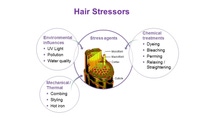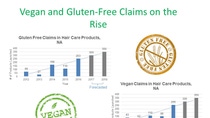Media
Stronger hair for the socially conscious
BASF launches advanced repair hair care ingredient that’s vegan and gluten-free.

Hair is said to be the most abused organ in the body. Our locks go through several environmental, physical and chemical stresses on a day-to-day basis. It is no wonder that hair care specialists continue developing products that help manage the type of damages our manes encounter daily.
Answering a need for something new to tackle this tress dilemma, BASF launched a new product— the Gluadin® Kera-P LM—at the 2017 New York Society of Cosmetic Chemists (NYSCC) conference earlier in May at the Jacob K. Javits Convention Center. (NYSCC—also called Suppliers’ Day—has become the most highly attended event for all those seeking business development, education and innovation in cosmetic chemistry).
Gluadin Kera-P LM is a raw material/low-molecular-weight protein that can be incorporated into shampoos, hair gels, conditioners or any type of hair care product for daily use.
This low-molecular-weight protein, exclusive to BASF, naturally strengthens, repairs and protects your ringlets. What’s unique about low-molecular-weight protein hydrolysates is that they can penetrate through the cuticle into the cortex, whereas higher molecular weight will stay in the cuticle or at the surface of hair. When penetrating the cortex, protein hydrolysates can bring relief from various stressors and reload hair with protein building blocks. In short, the new microproteins fix hair from the inside and protect the hair surface while providing easier combing.
.jpg)
“The molecular weight, the size of the molecules, it’s small enough that it allows you to penetrate deep into the core of the hair,” said Joel Basilan, Manager, Application Technology Care Chemicals, Personal Care N.A., BASF during an interview at the trade show.
Additionally, copper is often found in human hair that comes from water sources used to wash hair, as well as swimming pools, which is known for damaging the hair cuticle. The new product solves this problem, according to Shawn Grimaldis, Technical Service Hair & Body Care Specialist, N.A., BASF.
“We found that proteins that we’re using serve as antioxidants, so they’re reducing metallic free radical formations, and by doing that, it decreases the induced natural hair aging,” he said.
But BASF did not stop there. Since shampoos today are no longer created as basic cleansing products, but need to offer additional benefits or be suitable for different consumer needs, the chemical giant went the extra mile and made this product gluten-free and vegan.
While wheat proteins are often used in hair products, 6 percent of the population (18 million individuals) are wheat/gluten sensitive and are told to avoid this composite of storage proteins, per a study published in the journal of Digestion.
“Nowadays with the challenges of allergic reactions to gluten, this product allows you to stabilize the building blocks that are missing in hair, it strengthens and basically rejuvenates it,” Basilan added.
Additionally, 1 million Americans were identified as vegan in 2013 and that trend is not going away. Veganism has grown to 2.5 percent of the U.S. population, up from 1 percent in 2009, and 78.5 percent are female, according to www.toprntobsn.com/veganism
And the animal friendly trend is spilling from food into personal care. Gluadin Kera-P LM is a vegan alternative to natural keratin. Keratin remains the preferred protein active ingredient, accounting for more than 60 percent of all protein-containing products, per Global New Products Database. Keratin, however, is known for being made from animal products (protein from the ground-up horns, hooves, feathers, quills and hair of various animals that is found in hair rinses, shampoos and permanent wave solutions). This product is a low-molecular phyto-keratin for the personal care market based on plant-derived (soy and rice) protein building blocks.
“It’s been a growing trend from the consumers, so our customers have been asking for it,” Grimaldis added. “It’s not just gluten-free, it’s peanut free, tree nut free and pine nut free, anything that’s relatable to an allergen. Gluadin means natural, meaning it’s plant derived, so there’s no gluten and it’s vegan.”

Published by Anna Spiewak.
For media inquiries or to repurpose this article, please contact Lisa Brown.